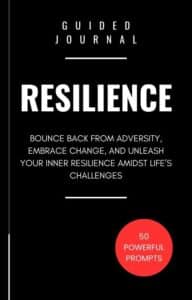In the grand tapestry of the human experience, resilience shines through as one of the most remarkable threads. It is the backbone of our survival, the buoy that keeps us afloat in the stormy seas of life, and the compass that guides us through the labyrinth of adversity. Welcome, dear reader, to an enlightening journey through the realms of resilience. This voyage, however, is not a passive one. You are not merely a spectator but an active participant. This article, “50 Deep-Dive Journal Prompts to Explore and Amplify Your Resilience,” is your map, your guidebook, your tool of discovery.
Imagine yourself as a miner, delving deep into the rich veins of your psyche, chiseling away at the rock of your experiences to uncover the gleaming gems of resilience. Each journal prompt is a spark, a catalyst, an invitation to introspection. It beckons you to peel away the layers of your consciousness, to probe the depths of your spirit, and to confront the contours of your inner landscape.
This is not an ordinary exploration. It is a deep, profound dive into the ocean of self-awareness, where the pearls of resilience lie hidden in the sands of time. It is about understanding that resilience is not just a trait we possess but a muscle we can train, a skill we can hone, a quality we can amplify. As we journey together through these prompts, remember: every question is a stepping stone, every answer a revelation, and every insight a testament to your inherent strength.
Harnessing the Power of Resilience: An In-depth Exploration
Have you ever noticed how some people seem to bounce back from life’s harshest trials and tribulations, while others seemingly break under pressure? The key difference lies within a powerful trait known as resilience. This trait, often misunderstood, is not about avoiding stress or hardship, but rather it’s about learning to thrive amidst adversity.
Understanding Resilience
Resilience, in its simplest form, is the capacity to recover quickly from difficulties; it’s about toughness and mental elasticity. It’s like a rubber band that, no matter how far it’s stretched or twisted, always manages to regain its original shape. In the context of human behavior, resilience is the psychological strength that enables an individual to rebound from adversity and keep moving forward.
Resilience is not a trait that people either have or do not have. It involves behaviors, thoughts, and actions that anyone can learn and develop. The ability to learn resilience is one reason research has shown that resilience is fundamental for mental health.
The Ingredients of Resilience
Resilience is a complex trait that involves a blend of several qualities. Optimism, for instance, plays a crucial role in resilience. Optimistic people tend to see the good in situations, no matter how bleak they may appear. They are the ones who, when faced with a closed door, start looking for a window instead.
Additionally, resilience involves a sense of purpose or meaningfulness in life. This sense of purpose can act as a compass, helping individuals navigate through the stormiest seas of life.
Emotional intelligence, or the ability to understand and manage our feelings, is another key component of resilience. It allows us to stay calm under pressure, manage our stress levels, and bounce back from setbacks more effectively.
Resilience in Action: Real-Life Examples
Consider the story of Thomas Edison, the brilliant inventor. After thousands of failed attempts to create a functional light bulb, he famously said, “I have not failed. I’ve just found 10,000 ways that won’t work.” This is resilience in its most vibrant form – the ability to maintain optimism and persistence in the face of repeated failure.
Another vivid example of resilience is seen in the life of J.K. Rowling, the author of the Harry Potter series. Rowling faced numerous rejections from publishers, lived in near-poverty, and struggled with depression. Yet, she persisted, held on to her dream, and eventually created a world-renowned series that has touched the hearts of millions.
Cultivating Resilience: A Path to Personal Growth
Developing resilience is not about eliminating stress or adversity from our lives. Instead, it’s about learning to cope with these challenges in a healthier way. It’s about fostering optimism, developing emotional intelligence, and finding a sense of purpose in our lives.
Remember, resilience is like a muscle. The more you use it, the stronger it becomes. So, next time you face a challenge, don’t shy away from it. Embrace it, learn from it, grow from it. Because that’s what resilience is all about – turning adversity into an opportunity for growth.
In conclusion, dear reader, resilience is a journey, not a destination. It’s about cultivating the strength to overcome adversity, the courage to keep moving forward despite setbacks, and the wisdom to learn from our experiences. Harness the power of resilience, and you’ll find that not only can you bounce back from life’s difficulties, you can also thrive amidst them.

Unlocking Resilience Through Journaling
Have you ever wondered why some people manage to bounce back from adversity stronger than ever, while others struggle to recover? The secret may lie in a simple, yet powerful tool: journaling.
Defining Journaling
At its core, journaling is the practice of writing down your thoughts, feelings, and experiences regularly. It’s like having a conversation with yourself, charting your inner world’s landscapes, your dreams, your fears, and your triumphs. Journaling is not just for writers or creatives; it’s a practice that can benefit anyone willing to explore their inner world.
The Power of Journaling in Building Resilience
Resilience is your ability to adapt to adversity, trauma, tragedy, threats, or significant sources of stress. It’s not about avoiding hardship but learning how to thrive even in the face of it. So, how does journaling help build resilience? Let’s dive in.
1. Self-Understanding and Awareness
Through journaling, you can gain a better understanding of your thoughts and feelings. By putting your experiences into words, you are forced to think about them critically, allowing you to recognize patterns and triggers in your behavior. This self-awareness is the first step towards resilience, as it allows you to understand your reactions to stress or adversity.
2. Emotional Catharsis
Journaling provides an outlet for expressing emotions you might not feel comfortable sharing with others. Writing about your feelings helps you process them, reducing feelings of overwhelm. It’s a form of emotional catharsis, allowing you to release pent-up feelings and stress, which is a significant step towards resilience.
3. Problem-Solving
When you journal, you’re not just documenting your life; you’re also problem-solving. Writing about a stressful event forces you to look at it from different angles, helping you find solutions and see the situation from a new perspective. This problem-solving aspect of journaling strengthens your resilience, as it equips you with strategies to handle future adversities.
4. Tracking Progress and Celebrating Growth
Journaling allows you to track your progress over time. You can look back at previous entries and see how you’ve grown and changed. This realization of personal progress is incredibly empowering and a great resilience booster.
Your Journey to Resilience
Now that you understand the transformative power of journaling for resilience, why not give it a try? All you need is a pen, paper, and an open mind. Remember, there’s no right or wrong way to journal. It’s your personal space to express yourself, reflect, and grow.
So, start your journaling journey today and unlock the resilience within you. You might be surprised by just how strong you truly are.

Journal Writing Prompts for Resilience
Write about a time when you showed resilience in the face of adversity. How did you overcome it and what did you learn?
How does the concept of resilience play a role in your personal life?
If resilience were a person, what characteristics would it have?
Reflect on how your resilience has grown over the years.
What are some ways you can cultivate resilience in your everyday life?
How has resilience helped you to achieve your goals?
Write a letter to your future self, emphasizing the importance of resilience.
How can resilience help in building strong relationships?
Explore the relationship between resilience and emotional intelligence.
How can resilience be used as a tool to combat stress and anxiety?
Write about a role model who exemplifies resilience.
How does resilience contribute to personal growth?
How can resilience be nurtured in children?
Explore the role of resilience in maintaining mental health.
How does resilience affect your decision-making process?
Reflect on a situation where you wish you had been more resilient.
How does resilience aid in overcoming failure?
Write a story where the main character’s resilience helps them overcome a significant obstacle.
How do you think society views resilience?
What are some strategies that you can use to enhance your resilience?
How has your understanding of resilience changed over time?
How does resilience play a role in your professional life?
Reflect on a situation where resilience played a key role in your success.
How can resilience be used as a coping mechanism in difficult times?
What does resilience mean to you in one sentence?
Explore the relationship between resilience and self-esteem.
How does resilience relate to the concept of ‘grit’?
Write about a historical figure who displayed great resilience.
How does resilience contribute to overall well-being?
How can resilience help in overcoming personal insecurities?
Write about a time when your resilience surprised you.
How does resilience help in dealing with unexpected life changes?
Reflect on the role of resilience in your spiritual life.
How can resilience help in facing fears and phobias?
How does resilience contribute to the process of healing?
Write a poem about resilience.
How can resilience help in dealing with grief and loss?
Reflect on the role of resilience in maintaining physical health.
How does resilience play a role in conflict resolution?
Write about a time when resilience helped you stand up for yourself.
How does resilience contribute to maintaining a positive outlook in life?
Write a letter to resilience, expressing your gratitude.
How can resilience help in achieving long-term goals?
Reflect on a situation where you had to rely on others’ resilience.
How does resilience play a role in overcoming addiction?
Write about a time when your resilience was tested to its limits.
How can resilience help in dealing with criticism and rejection?
Reflect on the role of resilience in your academic life.
How does resilience contribute to self-discovery?
Explore the relationship between resilience and patience.
Download Printable Journal Prompts (PDF) >>
Guided Journal for Resilience
50 Writing Prompts to Bounce Back from Adversity, Embrace Change, and Unleash Your Inner Resilience Amidst Life’s Challenges

Life can be a whirlwind of challenges, throwing unexpected curveballs that test our mental fortitude and emotional resilience. For many, navigating through these obstacles can be a daunting task, leading to feelings of overwhelming stress, anxiety, and self-doubt. You might be feeling stuck, unable to see the path forward through the thicket of life’s challenges. Or perhaps you’re wrestling with past traumas, unsure of how to process and move beyond these difficult experiences.
These struggles are not just burdensome; they can be paralyzing. You might find yourself spiraling into negative thought patterns, a prisoner of your own mind. You may feel emotionally drained, struggling to keep your head above the tide of your worries. Perhaps you’ve noticed that these challenges are beginning to impact your relationships, your career, or even your physical health. The weight of these experiences can feel like a heavy stone, dragging you down and hindering your progress in life.
But what if there was a way to not just survive, but thrive amidst these challenges? What if you could harness these experiences to foster personal growth and build emotional resilience?
Enter the ‘Guided Journal for Resilience,’ designed to be your personal beacon of light amidst life’s storms. This transformative journal is more than just a book; it’s a journey of self-discovery and personal empowerment. It serves as a lifeline, leading you away from the shadows of your struggles and towards the light of resilience and self-empowerment.
The ‘Guided Journal for Resilience’ offers a structured, step-by-step approach to overcoming adversity. It’s filled with thought-provoking prompts that guide you towards self-reflection and introspection. By writing down your thoughts and feelings, you can gain a clearer understanding of your emotions, recognize destructive thought patterns, and develop healthier coping mechanisms.
But this journal goes beyond providing a safe space for expressing emotions; it’s a tool for transformation. By actively engaging with the exercises, you’re not just working through your feelings; you’re cultivating emotional resilience. You’re learning how to bounce back from adversity, to embrace change, and to view challenges as opportunities for growth.
Whether you’re dealing with everyday stressors or grappling with deeper emotional issues, the ‘Guided Journal for Resilience’ is your companion on the journey towards a stronger, more resilient you. It’s not just about surviving life’s storms, but learning how to dance in the rain.
So, are you ready to embark on a journey of self-discovery and emotional resilience? Are you ready to turn adversity into strength? If so, the ‘Guided Journal for Resilience‘ is here to light the way. Start your journey today, and discover the power of resilience within you.
As our journey through the “50 Deep-Dive Journal Prompts to Explore and Amplify Your Resilience” reaches its end, it is time to surface from the depths of introspection and breathe in the fresh air of awareness. You’ve delved into the caverns of your experiences, chiseled the rocks of your challenges, and unearthed the gems of resilience. Each prompt has been a lantern, illuminating the path to self-discovery and self-improvement.
However, dear reader, the conclusion of this article is not the end of your journey. Rather, it marks the beginning of a new chapter, a new challenge. The skills you’ve honed, the insights you’ve gained, and the resilience you’ve amplified are not merely for your own benefit but to light the way for others, to inspire them to embark on their own journey of resilience.
As we draw the curtains on this enlightening expedition, let us part with this thought-provoking question to ponder: How will your newfound understanding of resilience reshape your approach to life’s challenges? Remember, resilience is not merely about weathering the storm, but learning to dance in the rain. The journey to resilience is a continuous one, filled with trials and triumphs, challenges and conquests. As you continue to explore your resilience, may you always find the strength to rise, the courage to persevere, and the wisdom to thrive.

